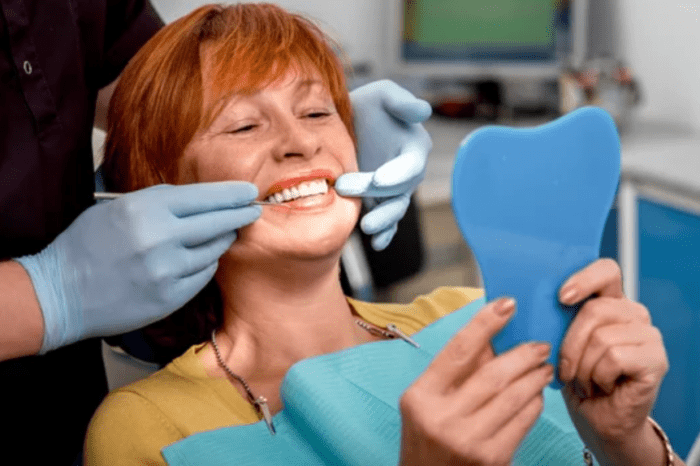Dentures provide a valuable solution for people with missing teeth. These devices can restore their ability to eat, speak, and smile with confidence. However, ill-fitting dentures can pose huge risks to oral health and overall well-being. Beyond pain and discomfort, this can damage your oral health.

Discomfort
Ill-fitting dentures can cause pain, irritation, and sore spots on the gums. The rubbing and friction can lead to oral sores. This will make it hard to wear dentures for a long time. Not being able to wear your dentures can get in the way of your daily activities.
Speech Issues
Poorly fitting dentures can affect your ability to speak clearly. They may slip or move during speech. This can cause mumbling or slurred speech. If you are in a social setting, this may lead to social anxiety. People with poorly fitting dentures are less likely to speak freely.
Difficulty Chewing
Ill-fitting dentures can greatly impact your ability to chew and properly process food. As a result, you may have difficulty eating certain foods. This may limit your diet to softer and less nutritious options.
Additionally, inadequate chewing can affect digestion. Larger food particles may be harder to break down, leading to digestive issues, such as indigestion and nutrient malabsorption.
A limited diet can result in nutritional deficiencies. This may include a lack of essential vitamins, minerals, and fiber. Over time, this can impact overall health and increase the risk of various health conditions.
Oral Sores and Ulcers
Another issue with ill-fitting dentures is that they create pressure points and cause sores or ulcers on the gums. These open wounds can become prone to infections.
When dentures don’t fit, they can trap food particles and grow bacteria. This increases the risk of gum infections, such as gingivitis or periodontitis. This may lead to gum inflammation, bleeding, and tooth loss for your remaining teeth.
Bone Loss
Unfortunately, ill-fitting dentures can speed up bone loss in the jaw. The pressure on the jawbone decreases when dentures don’t fit. Without the support, your bones can lose density. Over time, this can affect your looks and lead to a sunken or prematurely aged appearance.
Poorly fitting dentures can cause instability and constant movement in the mouth. This can lead to chronic mouth soreness and discomfort. This will make it hard to enjoy everyday activities like eating and speaking.
Mental Impact
In addition to pain, ill-fitting dentures can impact your self-confidence and self-perception. Fear of slipping dentures can lead to social anxiety and self-consciousness. This may cause you to miss social events.
Denture concerns may cause some to withdraw from social situations or conversations. This isolation can also have negative effects on mental and emotional well-being.
Oral Health Issues
Ill-fitting dentures can increase the risk of oral infections, including fungal infections like oral thrush. These infections can cause pain and a host of oral health issues.
When dentures don’t fit, it becomes hard to clean them. Poor oral hygiene can also lead to plaque buildup, bad breath, gum disease, and even tooth decay in your natural teeth.

